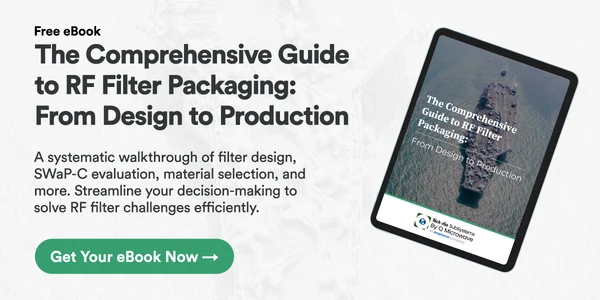When an off-the-shelf filter doesn’t cut it for your project, the only solution is to get a custom...
How to Get the Best Quote for Custom RF Filters

Procuring the appropriate custom RF filters for any project requires in-depth theoretical knowledge and practical experience. Most experienced RF engineers excel in both areas. However, while writing proposals and designing models, they often have limited time left for vendor research to procure high-performance custom components.
The answer to this challenge could be to offload the task to junior RF engineers, but with the US job market already short six million engineers, is that the best use of their time?
Although challenging, busy RF engineers can still maximize vendor partnerships and quotes by being prepared. In this guide, we’ll share the step-by-step process to getting the best quote for your custom RF filters. Our goal is to help RF engineers procure high-quality components that meet your RF subsystem specifications, budget limits, and project deadlines.
Step 1: Prepare Your Custom RF Filter Specifications
RF engineers can struggle with translating complex project requirements into precise RF filter specifications. Finding a custom part for your application’s use case could lead to weeks, if not months, of extensive research and testing. What’s worse is that initial RF filter requirements aren’t always doable. As a result, RF engineers must validate performance trade-offs based on component availability and constraints.
You can streamline procurement by analyzing your custom RF filter needs based on detailed, explicit parameters like frequency range and insertion loss. However, you’ll yield better results if you work with a RF manufacturer for the following technical considerations:
Environmental Screening
There are three crucial factors your RF filter manufacturer will check to identify the potential environmental stress that your RF filter will face. These tests are factored into the quote pricing and timeline:
-
Humidity: Specify the minimum and maximum relative humidity (RH) that your RF filter will be exposed to daily. A manufacturer can test if the custom filter will maintain electrical performance.
-
Vibration Levels: Analyze the vibration frequency spectrum of the estimated g-force that your filter must withstand.
-
Shock Environment: Estimate how much mechanical stress your setup might undergo—use g-force and pulse duration for computations.
Custom Packaging
The custom RF filter packaging is a small but important part of your quote. The material needed to protect the component will heavily depend on your filter’s size, weight, and environmental screening requirements. For example, if your setup is in high-power applications, the filter packaging material will focus on heat dissipation.
Topology
Most custom RF filters are categorized by topology—your RF manufacturer will assess which architecture matches your needs when they create a new filter quote.
There are generally three categories: lumped element, combline (i.e., cavity filter), and ceramic resonator. Compact lumped filters are best suited for applications that require lower frequencies, combline uses resonators that suit narrow bandwidth applications, and ceramic filters have good temperature stability that suits higher frequencies.
Step 2: Find an Experienced Custom RF Filter Supplier
Vendor research can be very time-consuming due to the vast number of manufacturing options available. Although trade shows, individual research, directories, and conventions give you insights into potential suppliers, you’ll still end up with multiple options.
Moreover, RF engineers working on time-sensitive projects in critical industries, such as telecommunications and defense, can’t waste resources by frequently changing vendors. They need a reliable partner right from the start. To ensure you find a reputable RF manufacturer, prioritize the following when shortlisting candidates:
-
Expertise: Look for suppliers with a proven track record in off-the-shelf and custom RF filter design. Our team at Q Microwave has been providing quality RF filters and subsystems for 25+ years now.
-
Certified: The ideal RF manufacturer will be AS 9100 Certified and ISO 9001 Certified.
-
Technical Resources: Translating complex project details can be challenging, but conveying them to your team might be even more so. Ideally, a competent RF filter vendor should help with training. Q Microwave provides all our clients with extensive product training material, assists with spec development, and drafts mechanical outlines.
-
Reliability: The pressure to deliver in fast-paced industries like military defense, aerospace, and telecommunications leaves RF engineers with limited time for procurement. Q Microwave understands this challenge. Our team delivers custom RF filter prototypes in just six to eight weeks, and for urgent situations, we could offer next-day service on standard options.
Step 3: Request for a Quote or Live Consultations
After shortlisting your potential vendors, proceed with requesting a proposal. A well-crafted, data-driven request for quote (RFQ) outlines your RF filter specifications, projected delivery timeline, and industry-relevant compliance requirements. Note that your total quote will heavily depend on these factors.
Here are some tips to communicate your needs effectively with RF filter vendors:
-
Compute the Total Cost of Ownership: Estimate the long-term costs associated with your RF filters, like maintenance, redesign fees, and repairs.
-
Check the Technical Specifications: Carefully review if the technical specifications outlined in the quotes match your initial requirements, e.g., filter topology, center frequency, bandwidth, insertion loss, return loss, and industry-specific compliance requirements.
-
Ask for Lead Times: Compare the lead times your vendors provide with your project timeline—of course, leave some leeway for unexpected mishaps.
-
Talk About After-Sales Support: Avoid working with custom RF filter suppliers that don’t offer comprehensive warranty and responsive support.
Get the Best Quotes for Custom RF Filters at Q Microwave
Talk to our sales team about your project. We’ll help you determine the RF filters and subsystems that best fit your use case. Our goal is to materialize your unique requirements into the component fast, so that you can proceed with your project.



.jpg?height=200&name=Mastering%20Bandpass%20Filters%20(A%20Guide%20for%20RF%20and%20Electrical%20Engineers%20in%20Military%20and%20Aerospace).jpg)
